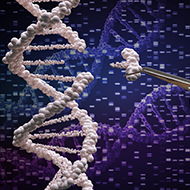
Dialogue will consider gene editing introduced into farming systems.
A consultation is to be held in the UK to discuss gene editing in farmed animals to investigate the public's hopes and concerns.
The public dialogue will assist in shaping responsible research and innovation as gene editing technologies develop.
Professor Melanie Wilson, executive chair of the Biotechnology and Biological Sciences Research Council (BBSRC), explained: “The UK has outstanding expertise in animal bioscience, and we welcome the opportunity to have a wide-ranging public dialogue which will enable a deeper exploration of views and help inform associated policies.
Gene editing, which is the targeted alteration of DNA in a living cell, allows for changes to secure certain physical traits in new generations of farmed animals. Genome editing allows for faster and more precise changes than traditional breeding methods.
While research on genome editing in the UK is advance, the techniques are not currently being used in animals bred for consumption, although it has been approved in other parts of the world. This is one of the many areas that will be considered in the consultation.
Dr Chris Proudfoot of the Roslin Institute said: “The Roslin Institute is a world leader in gene editing of farmed animals, with a Large Animal Research and Imaging Facility that significantly enhances our ability to conduct comprehensive studies towards better animal health, welfare and sustainability.
“This public dialogue is fundamental to understand how people see these technologies and their impact on the future of food.”
Announced by the BBRSC and the Nuffield Council on Bioethics, the consultation will involve around 80 members of the public between May and July.
The Roslin Institute is overseeing the consultation, and the social research consultancy Basis Social.
Danielle Hamm, director of the Nuffield Council on Bioethics, commented: “As the Government considers next steps for regulation of genetic breeding technologies, there is a real opportunity now to ensure that policy making in this area is aligned with public interests.
“Last year, Basis Social worked with us on a rapid dialogue to help identify public hopes and fears about these technologies, which fed into our influential report ‘Genome editing and farmed animal breeding: ethical and social issues’.
“We are pleased to be taking forward this debate with UKRI-BBSRC and Sciencewise, and working with Basis Social again, to further explore public perspectives on the future of our food and farming system.”



 The Veterinary Medicines Directorate (VMD) is inviting applications from veterinary students to attend a one-week extramural studies (EMS) placement in July 2026.
The Veterinary Medicines Directorate (VMD) is inviting applications from veterinary students to attend a one-week extramural studies (EMS) placement in July 2026.